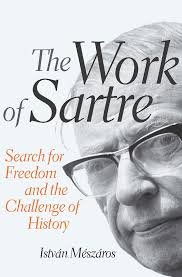First published in 1979, this book met acclaim as a doubly important work of radical philosophy. Its subject, Jean-Paul Sartre, was among the twentieth century’s most controversial philosophers; its author, István Mészáros, was himself establishing a reputation for contributions to the Marxian tradition. In this updated and expanded volume, Mészáros examines the manifold aspects of Sartre’s legacy. Mészáros has a strong connection with Sartre, and has clearly explored and struggled with his ideas extensively, concludes Miranda Nell.
The Work of Sartre: Search for Freedom and the Challenge of History. István Mészáros. Monthly Review Press. October 2012.
 Although Jean-Paul Sartre was a popular and influential philosopher, he has not become as common a topic for serious scholarship as some of his peers. While Husserl and Heidegger are engines of continental thought, and Merleau-Ponty has a sizable following, Sartre tends to be used in introductory courses more than dissertations. Nonetheless, many philosophers do consider his work important and look forward to new insights about his legacy. The Work of Sartre promises to be such a book.
Although Jean-Paul Sartre was a popular and influential philosopher, he has not become as common a topic for serious scholarship as some of his peers. While Husserl and Heidegger are engines of continental thought, and Merleau-Ponty has a sizable following, Sartre tends to be used in introductory courses more than dissertations. Nonetheless, many philosophers do consider his work important and look forward to new insights about his legacy. The Work of Sartre promises to be such a book.
The first edition of this book was published in 1979, even before Sartre’s death, with the intention of a second volume to follow. Volume Two was never completed, but this expanded and updated edition includes an additional section under the subtitle “The Challenge of History” which fulfils that role, if with greater brevity than originally expected. The angle of the book is more political than metaphysical, and the final section is focused specifically on Sartre’s Marxian turn. This is done with a general sympathy for the conclusions, from the perspective that the earlier works have to be understood as initial attempts at the same basic issue, not so much rejected as reconfigured.
Istvan Mészáros came from Hungary and made Sartre’s acquaintance shortly after the Hungarian revolution, with a particular interest in clearing up some misunderstanding regarding the Hungarian philosopher Gyorgy Lukacs. Mészáros believed that Sartre and Lukacs were actually quite similarly-minded and would benefit from a dialogue. While the promised interchange never took place (perhaps due to governmental interventions in the mail), Sartre was informed and duly apologized for earlier statements, in which he had accused Lukacs of actively supporting Janos Kadar’s Soviet-enforced government, when rather Lukacs had endured house arrest, exile, and personal suffering to stay true to the revolutionary state he believed in.
The influence of this background is evident throughout the book, as the interest in Sartre’s work is more than theoretical inquiry. He is presented as one of the few thinkers of his generation who maintains interest in a true re-imagining of society rather than being deflated by the failures of the early 20th century.
A generation earlier, when people like Lukacs became mature intellectuals… rebels against the bourgeois order emerging from the rank of the bourgeoisie were much more frequent… Just preceding the First World War we could perceive some kind of “crisis of conscience” among the best intellectual representatives of the bourgeoisie, resulting in many of them joining even some revolutionary organizations… in contrast to the loss of conscience and corresponding disposition to side unreservedly with the defense of capitalism by most of those who belonged to Sartre’s generation (p.326).
Sartre is presented as a radical and a Marxian of sorts, but most fundamentally as a philosopher of freedom. The book is divided into three parts and includes a brief preface and two introductions (one at the beginning, and a second at the opening of part three).
The first section is half the length of either of the others, and attempts to provide an overview of Sartre’s career and the development of his thought. It is clear from the writing that Mészáros is intimately familiar with Sartre’s corpus, and this part of the book felt like an honest struggle and attempt to organize a massive amount of information. He identifies three questions to focus on, then three forms Sartre works in, and finally six temporal periods that can be named over Sartre’s career. Throughout these different categorizations, though, there is the continuous thread of concern with the Sartrean project as one of agency, and it serves as something of a lead-in to the second part.
In part two, “The Search for Freedom”, Mészáros focuses on Sartre’s exploration of the human condition. He notes that Sartre’s entire project is itself a self-reflective manifestation of that condition, which he sees as consisting of “[first,] an uncompromising assessment and reassessment of his own internal limits – the authenticity or non-authenticity of his own choices and decision – and second the assertion of his subjectivity…” (p.93). This two-tiered investigation of agency, in its transparency and its particularity, is the search named in the title. Freedom, which Mészáros describes as “the most fundamental dimension of human existence passionately striving to reveal itself” (p.147), is at the root of Sartre’s ontology, and that is why it is also the key idea in his political work.
The third part of the book, “The Challenge of History” explores that political work more specifically. This section is the new addition to the work, and including its introduction, it adds 100 pages to the volume. Where the aforementioned part of the book is focused largely on the early work and Being and Nothingness, this part shifts the focus to the later work and Critique of Dialectical Reason (although both refer to a wide variety of sources). As Mészáros describes, Sartre is troubled by the paradox of unified subjectivity—of each of us being existentially free and yet being part of humanity and sharing a historical arc. This leads to concern with the meaning of violence and scarcity as elements of human exchange, and again, Mészáros sees the lack of conclusions in Sartre’s work only as further indication of how deeply he understood the necessary and ongoing contradictions that bring about the problem. There is also a chapter here on the alternative route of Levi-Strauss’ approach, which Mészáros is almost polemic in rejecting: “Levi-Straussian structuralism turns into a reified fetish the concept of structure precisely because of its arbitrary dichotomous treatment of history, counterposing even the mystificatorily frozen idea of “space” to that of the historically unfolding “time,” (p.284).
Overall, Mészáros has a strong connection with Sartre, and has clearly explored and struggled with his ideas extensively. At times the book feels a bit unedited, as there is some repetition, some stylistic shifting, and the occasional untranslated quote, but it is an accessible book with a clear philosophical standpoint. While The Work of Sartre does not feel especially polished, it is a genuine investigation with an aim toward potential pragmatic insights. Sometimes these insights are limited by the vastness of the subject, and the amount of contradiction inherent to it, but that is what Mészáros is particularly fascinated by: “Sartre’s passionate struggle with his –unachievable—account of ‘real history’…” (p.322) and the spectrum between hope and despair one feels in contemplating the future.
———————————————-
Miranda Nell received her PhD from the New School for Social Research in 2012 and is currently teaching in Michigan. Her interests include aesthetic experience, the exploration of variety and flexibility in knowledge, and the importance of non-cognitive modes of expression. Read more reviews by Miranda.








2 Comments